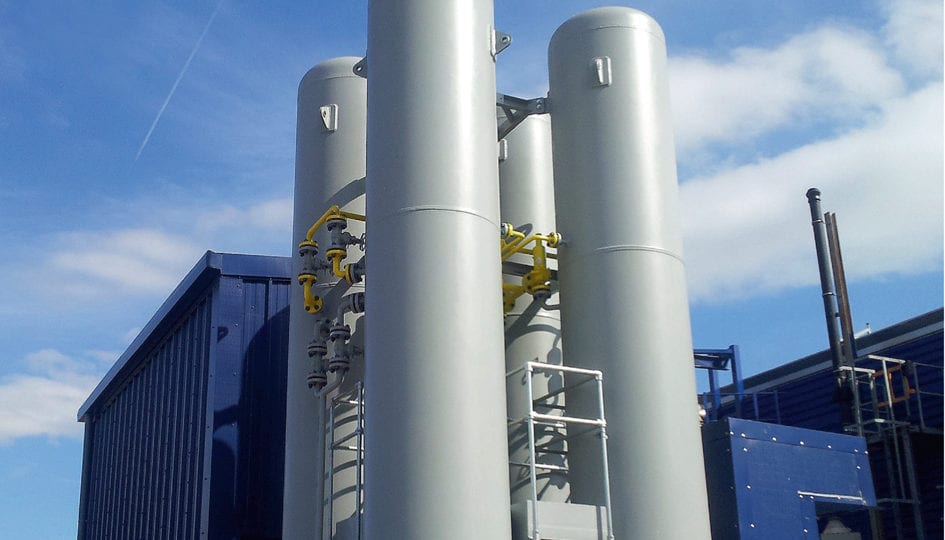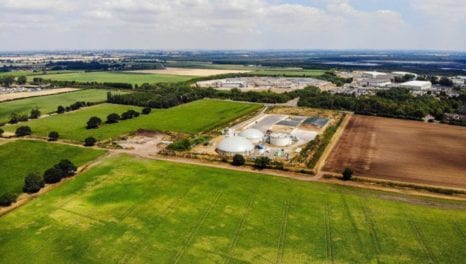Report explores possible roll out of BioSNG plants
Cadent has published a new report which explores what market frameworks, mechanisms and incentives would be needed to roll out a network of BioSNG (bio-substitute natural gas) plants across the country.
9th May 2018 by Networks

Cadent has been exploring new green energy frontiers, by helping fund the world’s first commercially operating BioSNG (bio-substitute natural gas) plant, which converts household waste into gas, in Swindon. It backed a successful trial plant at the site and has subsequently provided £8.6m of funding for the commercial plant, which is due to start production later this year.
The new report, which Cadent commissioned Ernst and Young to carry out, is entitled ‘Stimulating investment in BioSNG‘.
Stuart Easterbrook, Cadent’s future gas strategy manager, said: “Cadent is very excited to be one of the pioneers at the forefront of this great green gas revolution of the 21st century.
“In the future we could see a whole network of plants similar to the one we’re helping develop in Swindon springing up across the country. These would provide low carbon, sustainable and affordable energy that could be used with existing gas boilers and cookers or to fuel gas powered lorries and buses, while also reducing landfill waste and diesel emissions.
“What we’re doing with this report is to focus on the bigger picture to ensure that everyone starts to think about the things that will need to be in place to facilitate this.”
Cadent chief executive Chris Train added: “Cadent is passionate about decarbonising energy and finding innovative solutions to the future of gas. We’re expecting the BioSNG technology we’re helping develop to be game changing and we need to ensure the right support mechanisms are in place so we can hit the ground running and roll it out quickly and effectively.
“With this report we want to advance commercial and regulatory thinking and examine what frameworks could support BioSNG. We don’t yet have all the answers to this great challenge and we hope this report will help shape the debate as we explore the future with policymakers.”
Anthony Legg, head of power & utilities, economic advisory, Ernst and Young said: “There are a range of different ways that the government and Ofgem might be able to support investors into BioSNG projects.
“These options range from grants and guarantees of loans, through to various kinds of feed in tariffs or contracts for difference, or enabling gas distribution networks to invest in BioSNG plants as part of their regulated activities.
“Recognising that all of the available options have strengths and weaknesses and that further more detailed stakeholder engagement and quantitative analysis is needed; our report does not attempt to land on a single best option for policy makers to take forward.
“The report does, however, try and identify a short list of approaches which strike a good balance between de-risking projects to bring forward investments in the short term and exposing projects to the right amount of market forces to drive innovation and cost reductions over the medium and longer term.”
The new commercial £27m BioSNG plant in Swindon is being built by a consortium of partners made up of Advanced Plasma Power, Progressive Energy, Wales & West Utilities, CNG Services and Cadent. Backing of £11m for the plant was also awarded from Department for Transport’s Advanced Biofuels Demonstration Competition in September 2015 and over £5m is being contributed from the Network Innovation Competition, run by energy regulator Ofgem.
Comments
Login on register to comment
Related content

Gas
Cadent backs launch of major bio-CNG HGV refuelling station
Gas network’s £250,000 infrastructure investment ensures supplies to existing connected customers have not been impacted

Gas
Editor’s blog: The biggest tests of resilience are yet to come
Network content director Jane Gray reflects on the industry's coronavirus response to date and the challenges still to come.

Gas
From the front line: Chris Garside and Andy Simcoe, Northern Gas Networks
Key workers across the power and gas networks are playing a critical role in the national response to Coronavirus. Network has committed to profiling their stories.
Related supplier content

Power
Load patterns and lockdown: how Covid-19 is impacting electricity networks
Insights into dynamics on the low voltage network as the outbreak unfolds

Downloads
Protect electrical equipment from insulation failure
Insulation faults are a major cause leading to the eventual failure of electrical equipment. Partial discharge (PD) is a very reliable indicator of developing insulation faults. Regular PD testing allows users to detect and analyze PD activity

Heat
How E.ON. is helping the City of London become a zero emissions city
Discover Citigen. Deep in the heart of our bustling capital